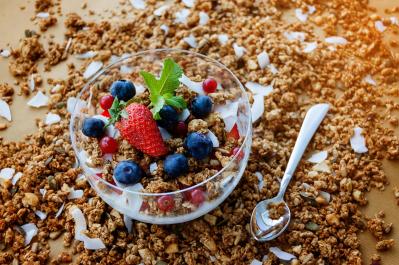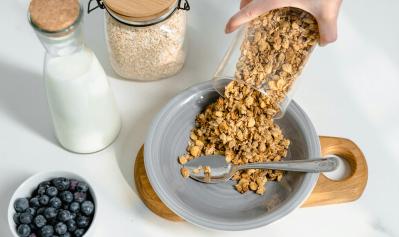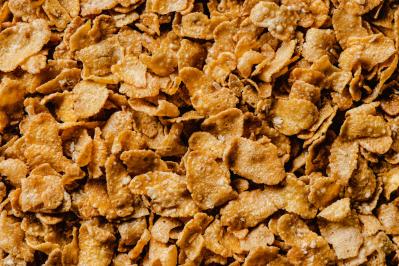
Analysis of Cereals
The term breakfast cereals or breakfast flakes covers muesli, cereal flakes and other crunchy cereal products. The starting product for breakfast cereals is grain.
Corn, oats, wheat, rice, millet and spelt are the main cereals used. The cereals are rolled, roasted, baked, puffed, extruded or shredded during processing. The best-known cereals are cornflakes made from maize. Mueslis and cereals are usually eaten for breakfast.
Classic mueslis such as fruit, nut or chocolate mueslis consist of at least one whole grain cereal product and at least one non-cereal component such as dried fruit (berries, apples, raisins), oilseeds (nuts or linseed), honey, chocolate or yoghurt chips.
Crunchy mueslis (also known as crunchy mueslis or granola) get their characteristic crunchy consistency from baking. Crunchy mueslis are also often refined with dried fruit, nuts or chocolate. As a source of carbohydrates and fiber as well as vitamins and minerals, mueslis and cereals make a valuable contribution to a healthy diet.
The total sugar content of a cereal product is made up of sugar that is naturally contained in the source products, such as dried fruit, and sugar that is added during production. There are a variety of muesli and cereal products that are characterized by different sugar contents. Consumers can find information on the total sugar content of the food in the nutritional table and the list of ingredients on the product packaging.

Challenge for producers and distributors of cereals
The production of muesli is a complex process that requires a high level of quality awareness and understanding of consumer needs on the part of the manufacturer.
The main challenges faced by distributors of muesli and cereal products are, for example
- Raw material quality and availability (e.g. with regard to seasonality and sustainability)
- Taste and consistency (e.g. with regard to consumer wishes and preferences)
- Legal requirements (e.g. mandatory labeling of allergens)
- Product safety (e.g. with regard to residues, microbiological safety)

Necessary tests for the analysis of cereals
Contaminants and residue analysis
Pesticides
Plant protection products and pesticides can find their way into cereals via the raw materials grain and dried fruit and affect the safety and quality of the products. Using a pesticide combination method, the accredited laboratories of the Tentamus Group offer the possibility of testing a sample for over 800 pesticides.
Heavy metals
Traces of heavy metals can find their way into the starting products and also into the finished muesli through contaminated soil and air pollution. Any residues of heavy metals such as lead and cadmium can be detected by means of residue analysis.
MOSH/MOAH
Saturated and aromatic mineral oil hydrocarbons (MOSH or MOAH, Mineral Oil Saturated/ Aromatic Hydrocarbons) can occur as contaminants in food and usually enter the product via the packaging. Special analytical methods such as gas chromatography and mass spectrometry can be used to detect any MOSH/MOAH residues in muesli samples.
Mycotoxin patulin
The product should be tested for the nephro- and hepatotoxic mycotoxin patulin as soon as apples are included in the muesli mix. The product should also be tested for other potentially occurring mycotoxins such as aflatoxins, ochratoxin A or deoxynivalenol, which can occur in grains and other ingredients of muesli and cereal products.
Microbiological testing
Depending on the ingredients used in the cereal product to be tested, various tests are used for microbiological quality assurance in order to protect the consumer from health risks and to guarantee product quality. The following tests are typically carried out.
- Total bacterial count
- Yeasts and molds
- Aerobic spore formers (Bacillus subtilis, Bacillus cereus)
- Special pathogens such as Salmonella, E. coli, Enterobacteriaceae
Chemical analysis
These chemical analyses are typically carried out on cereals for quality assurance purposes:
- Sorting: proportions of ingredients, quantitative content declaration (QUID)
- Acrylamide in highly heated products such as granola
- Coumarin in cereals containing cinnamon
- Theobromine and caffeine (if chocolate ingredients are included)
- Protein content (e.g. in protein muesli) or vitamins, if these are specifically advertised
Sensory testing
Another important part of the quality assurance of muesli products is sensory testing, in which the properties of the product are examined using the human senses. The following aspects in particular are assessed by trained testers:
- Appearance (e.g. color, size, shape of the individual ingredients)
- Smell (e.g. intensity, aromas such as sweet, fruity, nutty, any off-flavors)
- Taste (e.g. sweetness, acidity, salt content, bitterness, texture, aftertaste)
- Mouthfeel (e.g. crunchiness)
As muesli and cereals are usually consumed with milk or milk alternatives (such as yoghurt or soy or oat milk), the sensory test is usually carried out once with the unprepared product (i.e. without milk) and once with the prepared product (i.e. with milk).
Labeling
As a service, the Tentamus Group offers labeling tests according to national and international standards. The correct labeling of muesli and cereal products provides consumers with all the information they need to make an informed purchasing decision.
The labeling must comply with the applicable food law regulations and includes information such as
- Product name
- List of ingredients
- Net quantity
- Nutritional information
- Best before date
- Additives
- Allergens

Sample shipment for the analysis of cereals
For a fast and reliable analysis of your product, the Tentamus Group offers you the following options for sample transmission:
- Shipment by parcel service
- Personal delivery to one of our laboratories
- Pick-up service within Germany
Relevant legal bases and directives:
- Commission Regulation (EU) 2023/915 (Contaminants Regulation)
- Regulation (EC) No 396/2005 of the European Parliament and of the Council (maximum residue levels of pesticides)
- Regulation (EU) No. 1169/2011 of the European Parliament and of the Council (Food Information Regulation, FIR))
- Regulation (EC) No. 1924/2006 of the European Parliament and of the Council (VNGA)
Feel free to contact us:
+49 30 206 038 230
food@tentamus.com
Overview of Tentamus Group laboratories offering cereal analysis
The following laboratories from the Tentamus Group offer cereal analysis worldwide:
This could also be of interest to you:
- Analyses
Residue Analysis
Chemische Analysen
Microbiological Testing
Food Testing
- Product Categories
Analysis of Backed Goods
Dried fruit
Nuts
Seed
- Other Services